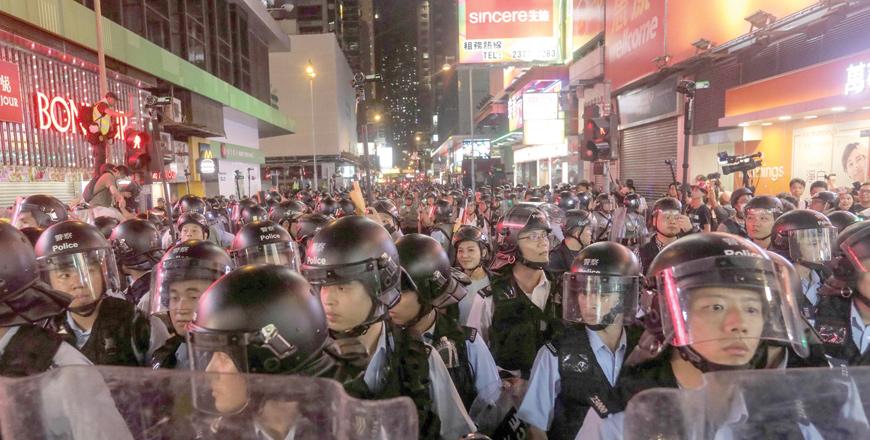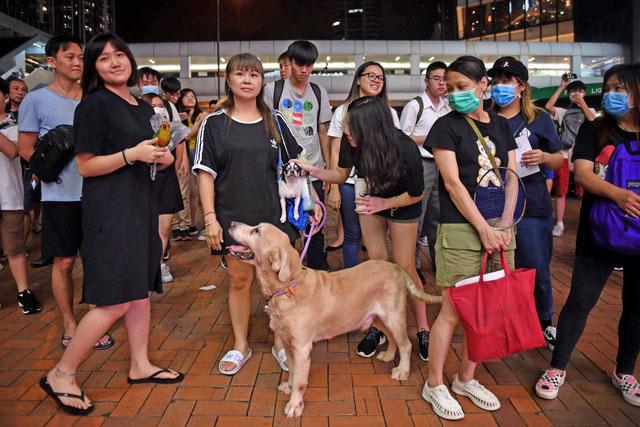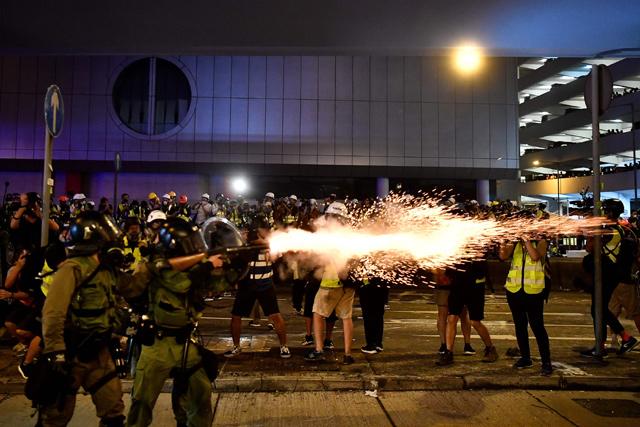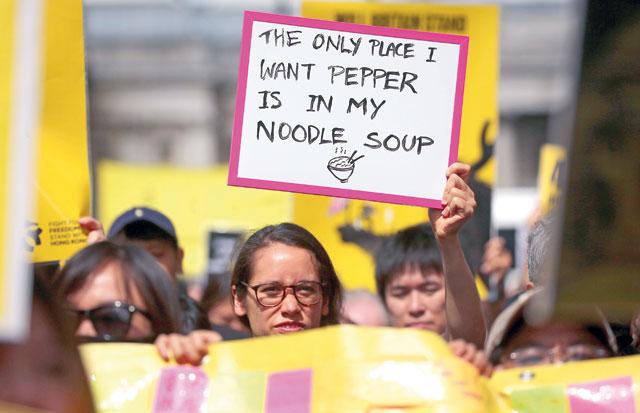You are here
Fresh clashes in Hong Kong after huge march to China station
By AFP - Jul 07,2019 - Last updated at Jul 07,2019

Police gather as they face protesters in the Mong Kok district in Kowloon after taking part in a march to the West Kowloon rail terminus against the proposed extradition bill in Hong Kong, on Sunday (AFP photo)
HONG KONG — Fresh political violence broke out in Hong Kong on Sunday night as riot police baton-charged anti-government protesters seeking to keep the pressure up on the city's pro-Beijing leaders, after a mass rally outside a train station linking the finance hub to mainland China.
Hong Kong has been rocked by a month of huge marches as well as separate violent confrontations with police involving a minority of hardcore protesters, sparked by a law that would have allowed extraditions to mainland China.
Sunday's clashes came hours after the first demonstration since young, masked protesters stormed parliament on Monday, plunging the city into an unprecedented crisis.
The extradition bill has been suspended following the backlash.
But that has done little to quell public anger, which has evolved into a wider movement calling for democratic reforms and a halt to sliding freedoms in the semi-autonomous city.
Earlier on Sunday, tens of thousands of people snaked through streets in the harbour-front district of Tsim Sha Tsui, an area popular with Chinese tourists, ending their march at a high-speed train terminus that connects to the mainland.
The march was billed as an opportunity to explain to mainlanders in the city what their protest movement is about given the massive censorship that Beijing's leaders wield.
It passed without incident.
But late Sunday police wielding batons and shields charged protesters to disperse a few hundreds demonstrators who had refused to leave.
AFP reporters saw multiple demonstrators detained by police after the fracas, their wrists bound with plastic handcuffs.
By early Monday only pockets of demonstrators remained with police occupying key intersections around the protest area.
The scene of the clashes — Mongkok — is a densely-packed working class district, which has previously hosted running battles between police and anti-government protesters in 2014 and 2016.
Hong Kong enjoys rights unseen on the mainland, including freedom of speech, protected by a deal made before the city was handed back to China by Britain in 1997. But there are growing fears those liberties are being eroded.
Sunday's clashes marred what had been an otherwise peaceful day of mass rallies aimed at reaching out to mainland Chinese visitors.
Organisers said 230,000 people marched while police said 56,000 attended at the peak.
"We want to show tourists, including mainland China tourists what is happening in Hong Kong and we hope they can take this concept back to China," Eddison Ng, an 18-year-old demonstrator, told AFP.
Hong Kongers speak Cantonese but protesters used Bluetooth to send leaflets in Mandarin — the predominant language on the mainland — to nearby phones, hoping to spread the word to mainlanders.
"Why are there still so many people coming out to protest now?" one man said in Mandarin through a loudspeaker. "Because the Hong Kong government didn't listen to our demands."
Many protest banners were written with the Simplified Chinese characters used on the mainland, not the Traditional Chinese system used in Hong Kong and Taiwan.
Protesters are demanding the postponed extradition bill be scrapped entirely, an independent inquiry into police use of tear gas and rubber bullets, amnesty for those arrested, and for the city's unelected leader Carrie Lam to step down.
Beijing has thrown its full support behind the embattled Lam, calling on Hong Kong police to pursue anyone involved in the parliament storming and other clashes.
Sunday's protest began on the waterfront — the first time a rally has taken place off the main island — and made its way to West Kowloon, a recently opened multibillion-dollar station that links to China's high-speed rail network.
The terminus is controversial because Chinese law operates in the parts of the station dealing with immigration and customs, as well as the platforms, even though West Kowloon is kilometres from the border.
Critics say that move gave away part of the city's territory to an increasingly assertive Beijing.
Under Hong Kong's mini-constitution China's national laws do not apply to the city apart from in limited areas, including defence.
But many say the relationship is changing.
Among recent watershed moments critics point to are the disappearance into mainland custody of dissident booksellers, the disqualification of prominent politicians, the de facto expulsion of a foreign journalist and the jailing of democracy protest leaders.
Related Articles
HONG KONG — Hong Kong's embattled leader Carrie Lam on Tuesday said she hoped "calm" will prevail after a massive weekend march passed witho
HONG KONG — Hong Kong descended into chaos on Sunday night as riot police fired tear gas and rubber bullets at anti-government protesters ho
HONG KONG — Hong Kong democracy activists kicked off a weekend of fresh rallies on Saturday in a major test for the movement following criti














